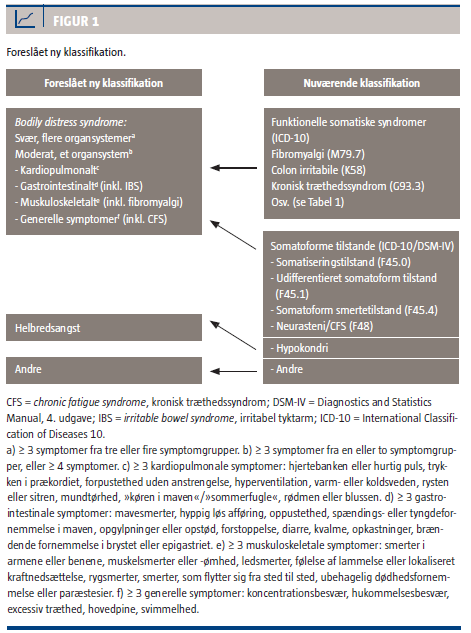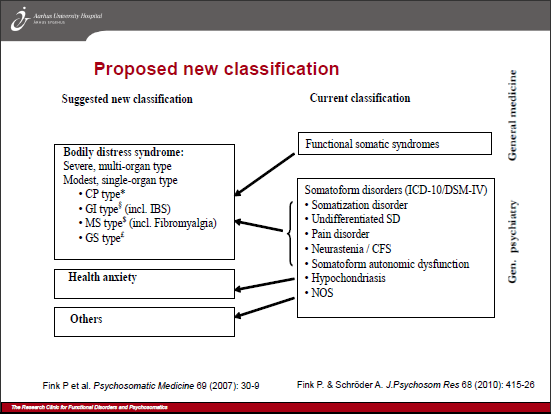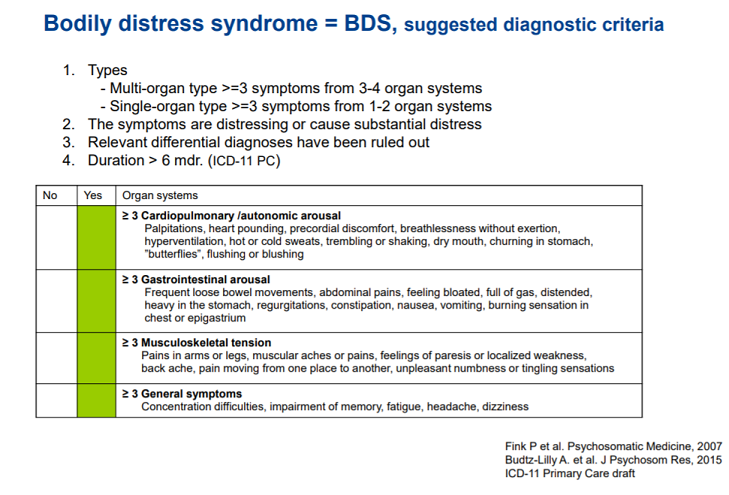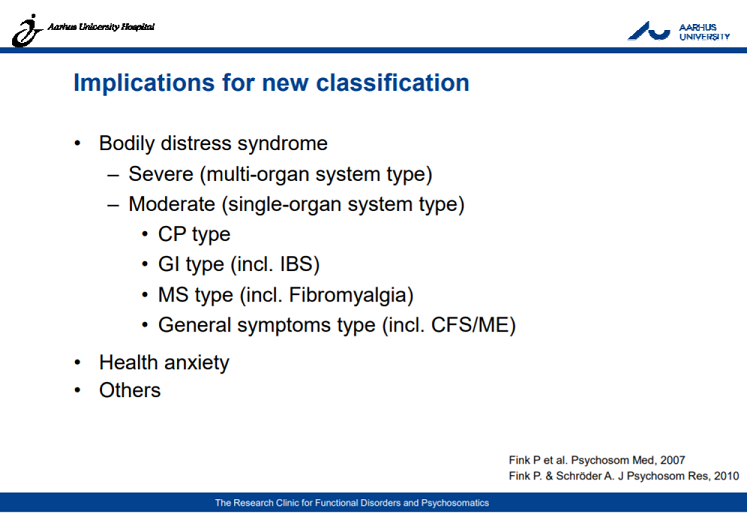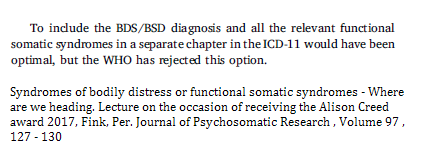Kalliope
Senior Member (Voting Rights)
The Danish Health Authorities has just published a guideline on how to code Functional Disorders.
ME has previously been included in the term Functional Disorders, but Danish politicians overruled this and decided WHO's definition of ME should be kept.
Here are the new codes on functional disorders and what is mentioned about ME in the guidelines:
An overview of diagnostic codes for functional disorders is shown below.
SKS Code Diagnosis
DR688A9 Functional disorder IKA
DR688A9A Functional disorder, multiorgan
DR688A9B Functional disorder, single organ
DR688A9B1 Functional disorder, general / fatigue
DR688A9B2 Functional disorder, gastrointestinal
DR688A9B3 Functional disorder, musculoskeletal
DR688A9B4 Functional disorder, cardiopulmonary
DR688A9B5 Functional disorder, neurological
DR688A9B6 Functional disorder, urogenital
DR688A9B9 Other functional disorder, single organ
DR688A9C Functional disorder, single symptom
.......
When the clinical assessment after completion of the assessment is that the patient has a functional disorder, it is generally recommended to use the new codes for functional disorders such as the primary codes (action diagnoses), as these in the vast majority cases will be more accurate and clinically meaningful than organ and / or special-specific syndrome diagnoses, such as chronic interstitial cystitis, iris profitable colon, health anxiety, fibromyalgia, myalgic encephalopmyelitis, etc. as these codes risk keeping both clinician and patient in either clean somatic or a purely psychiatric view of illness, which can be both equally inappropriate and stigmatizing for the patient.
The organ specific codes however, may, in a specific clinical judgment, be listed as supplemental or single standing codes where considered relevant. Regarding the specific code 'DG933A Benign myalgic encephalomyelitis', it is noted that it follows from Parliament's resolution V82 of 12 March 2019, that this Code Guide should separate this Code from the collective term functional disorders. This is accomplished by creating a new design in the neutral section DR68, while providing guidance below continued use of DG933A, which is located in another section, as however, at the same time it should be noted that codes from either or both paragraphs can out from specific clinical assessments be used to describe a symptom-image in a patient.
...
Case of chronic fatigue syndrome and ME
If a patient has chronic fatigue, which, after a thorough clinical assessment, may be probable as caused by a previous viral infection, the code DG933 Postviral fatigue syndrome may be relevant. If the assessment and the clinical assessment makes it more likely that there is an inflammatory state of the brain, the subcode DG933A Benign myalgic encephalomyelitis may be considered. Both codes are located below
area DG93 Other brain disorders.
If the above cannot be clinically supported and criteria as stated in section 3.1 is also fulfilled, then the new code for Functional Disorder, general/fatigue, is relevant.
SST: Kodning av funktionelle lidelser
google translation: Coding of functional disorders
ME has previously been included in the term Functional Disorders, but Danish politicians overruled this and decided WHO's definition of ME should be kept.
Here are the new codes on functional disorders and what is mentioned about ME in the guidelines:
An overview of diagnostic codes for functional disorders is shown below.
SKS Code Diagnosis
DR688A9 Functional disorder IKA
DR688A9A Functional disorder, multiorgan
DR688A9B Functional disorder, single organ
DR688A9B1 Functional disorder, general / fatigue
DR688A9B2 Functional disorder, gastrointestinal
DR688A9B3 Functional disorder, musculoskeletal
DR688A9B4 Functional disorder, cardiopulmonary
DR688A9B5 Functional disorder, neurological
DR688A9B6 Functional disorder, urogenital
DR688A9B9 Other functional disorder, single organ
DR688A9C Functional disorder, single symptom
.......
When the clinical assessment after completion of the assessment is that the patient has a functional disorder, it is generally recommended to use the new codes for functional disorders such as the primary codes (action diagnoses), as these in the vast majority cases will be more accurate and clinically meaningful than organ and / or special-specific syndrome diagnoses, such as chronic interstitial cystitis, iris profitable colon, health anxiety, fibromyalgia, myalgic encephalopmyelitis, etc. as these codes risk keeping both clinician and patient in either clean somatic or a purely psychiatric view of illness, which can be both equally inappropriate and stigmatizing for the patient.
The organ specific codes however, may, in a specific clinical judgment, be listed as supplemental or single standing codes where considered relevant. Regarding the specific code 'DG933A Benign myalgic encephalomyelitis', it is noted that it follows from Parliament's resolution V82 of 12 March 2019, that this Code Guide should separate this Code from the collective term functional disorders. This is accomplished by creating a new design in the neutral section DR68, while providing guidance below continued use of DG933A, which is located in another section, as however, at the same time it should be noted that codes from either or both paragraphs can out from specific clinical assessments be used to describe a symptom-image in a patient.
...
Case of chronic fatigue syndrome and ME
If a patient has chronic fatigue, which, after a thorough clinical assessment, may be probable as caused by a previous viral infection, the code DG933 Postviral fatigue syndrome may be relevant. If the assessment and the clinical assessment makes it more likely that there is an inflammatory state of the brain, the subcode DG933A Benign myalgic encephalomyelitis may be considered. Both codes are located below
area DG93 Other brain disorders.
If the above cannot be clinically supported and criteria as stated in section 3.1 is also fulfilled, then the new code for Functional Disorder, general/fatigue, is relevant.
SST: Kodning av funktionelle lidelser
google translation: Coding of functional disorders
Last edited:

